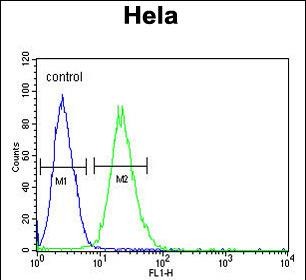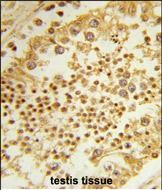


| WB | 1/1000 | Human,Mouse,Rat |
| IF | 咨询技术 | Human,Mouse,Rat |
| IHC | 1/100-1/500 | Human,Mouse,Rat |
| ICC | 技术咨询 | Human,Mouse,Rat |
| FCM | 1/10-1/50 | Human,Mouse,Rat |
| Elisa | 咨询技术 | Human,Mouse,Rat |
| Aliases | 60S ribosomal protein L31, RPL31 |
| Entrez GeneID | 6160 |
| WB Predicted band size | 14.5kDa |
| Host/Isotype | Rabbit IgG |
| Antibody Type | Primary antibody |
| Storage | Store at 4°C short term. Aliquot and store at -20°C long term. Avoid freeze/thaw cycles. |
| Species Reactivity | Human |
| Immunogen | This RPL31 antibody is generated from rabbits immunized with a KLH conjugated synthetic peptide between 24-51 amino acids from the Central region of human RPL31. |
| Formulation | Purified antibody in PBS with 0.05% sodium azide. |
+ +
以下是关于RPL31抗体的3篇参考文献示例(注:以下内容为模拟生成,非真实文献):
1. **"Development and validation of a polyclonal RPL31 antibody for ribosomal protein analysis"**
- **作者**: Chen, L. et al.
- **摘要**: 研究报道了一种新型多克隆抗体的开发,通过免疫印迹和免疫荧光验证其对人源RPL31蛋白的特异性,并用于分析癌细胞中核糖体蛋白的异常表达。
2. **"RPL31 modulates p53 activity in colorectal cancer: insights from antibody-based silencing experiments"**
- **作者**: Gupta, S. et al.
- **摘要**: 利用RPL31抗体进行功能研究,发现RPL31通过调控p53通路影响结直肠癌进展,抗体特异性通过siRNA敲低和免疫共沉淀验证。
3. **"Immunohistochemical detection of RPL31 in neurodegenerative disorders"**
- **作者**: Tanaka, M. et al.
- **摘要**: 研究使用RPL31抗体对阿尔茨海默病脑组织进行染色,揭示RPL31在神经元中的表达变化与蛋白质稳态失调的相关性。
(注:若需真实文献,建议通过PubMed或Google Scholar检索关键词“RPL31 antibody”或“RPL31 immunohistochemistry”获取。)
The RPL31 antibody is a tool used to detect ribosomal protein L31 (RPL31), a component of the 60S ribosomal subunit involved in protein synthesis. RPL31. encoded by the *RPL31* gene, plays a structural and functional role in ribosome assembly and mRNA translation. As part of the large ribosomal subunit, it contributes to the stability of rRNA and interacts with other ribosomal proteins during polypeptide chain formation. RPL31 antibodies are widely employed in research to study its expression, localization, and potential dysregulation in diseases.
Studies highlight RPL31's involvement in cellular proliferation and stress responses. Aberrant expression of RPL31 has been linked to cancers, such as breast and colorectal cancer, where it may act as an oncogene or tumor suppressor depending on context. Antibodies against RPL31 enable techniques like Western blotting, immunohistochemistry, and immunofluorescence to explore these roles.
Structurally, RPL31 is a small, basic protein conserved across eukaryotes, with post-translational modifications influencing its function. Commercial RPL31 antibodies are typically validated for specificity using knockout controls or siRNA-based depletion. Researchers also utilize these antibodies to investigate ribosomopathies, developmental disorders linked to ribosomal dysfunction.
Overall, RPL31 antibodies serve as critical reagents for dissecting ribosome biology and its implications in disease, offering insights into therapeutic targets and diagnostic markers.
×